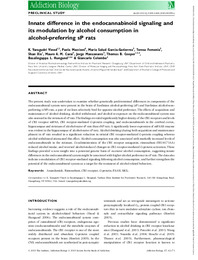Title:
Innate difference in the endocannabinoid signaling and its modulation by alcohol consumption in alcohol-preferring sP rats |
Authors:
Vinod, K. Yaragudri
Maccioni, Paola
García Gutiérrez, María Salud
Femenía Cantó, Teresa
Xie, Shan
Carai, Mauro A. M.
Manzanares, Jorge
Cooper, Thomas B.
Hungund, Basalingappa L.
Colombo, Giancarlo |
Editor:
John Wiley & Sons |
Department:
Departamentos de la UMH::Farmacología, Pediatría y Química Orgánica
Departamentos de la UMH::Farmacología, Pediatría y Química Orgánica
Departamentos de la UMH::Farmacología, Pediatría y Química Orgánica |
URI:
https://hdl.handle.net/11000/35432 |
Abstract:
The present study was undertaken to examine whether genetically predetermined differences in components of the
endocannabinoid system were present in the brain of Sardinian alcohol-preferring (sP) and Sardinian alcohol-nonpreferring
(sNP) rats, a pair of rat lines selectively bred for opposite alcohol preference. The effects of acquisition and
maintenance of alcohol drinking, alcohol withdrawal, and alcohol re-exposure on the endocannabinoid system was
also assessed in the striatum of sP rats.The findings revealed significantly higher density of the CB1 receptors and levels
of CB1 receptor mRNA, CB1 receptor-mediated G-protein coupling, and endocannabinoids in the cerebral cortex,
hippocampus and striatum of alcohol-naive sP rats than sNP rats. A significantly lower expression of mFAAH enzyme
was evident in the hippocampus of alcohol-naive sP rats. Alcohol drinking (during both acquisition and maintenance
phases) in sP rats resulted in a significant reduction in striatal CB1 receptor-mediated G-protein coupling whereas
alcohol withdrawal attenuated this effect. Alcohol consumption was also associated with markedly increased levels of
endocannabinoids in the striatum. Co-administration of the CB1 receptor antagonist, rimonabant (SR141716A)
reduced alcohol intake, and reversed alcohol-induced changes in CB1 receptor-mediated G-protein activation. These
findings provided a new insight into a potential genetic basis of excessive alcohol consumption, suggesting innate
differences in the endocannabinoid system might be associated with higher alcohol preference in sP rats. The data also
indicate a modulation of CB1 receptor-mediated signaling following alcohol consumption, and further strengthen the
potential of the endocannabinoid system as a target for the treatment of alcohol related behaviors.
|
Keywords/Subjects:
Anandamide
Rimonabant
CB1 receptor
G-protein
FAAH
MGL |
Knowledge area:
CDU: Ciencias aplicadas: Medicina: Farmacología. Terapéutica. Toxicología. Radiología |
Type of document:
info:eu-repo/semantics/article |
Access rights:
info:eu-repo/semantics/openAccess
Attribution-NonCommercial-NoDerivatives 4.0 Internacional |
DOI:
10.1111/j.1369-1600.2010.00299.x |
Published in:
Addiction Biology, 2012;17(1):62 -75 |
Appears in Collections:
Artículos - Farmacología, Pediatría y Química Orgánica
|

.png)
